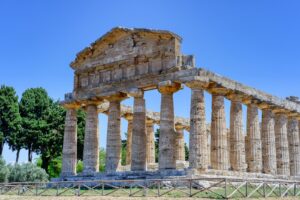Embarking on a Journey Through Time
Greece, a land steeped in history, mythology, and breathtaking landscapes, has captured the hearts and minds of countless adventurers. With ancient ruins, picturesque islands, and a vibrant modern culture, Greece offers an unparalleled experience for travelers. In this guide, we’ll uncover the best of ancient and modern Greece, taking you on a journey through time and revealing the country’s top must-see destinations. _
What part of Greece has the best beaches?
Ancient Greece: Where It All Began
The Acropolis: Athens’ Crowning Jewel
Perched atop a rocky outcrop in the heart of Athens, the Acropolis is an iconic symbol of ancient Greece. Home to the Parthenon, a temple dedicated to the goddess Athena, this archaeological site offers a unique glimpse into the lives of the people who once inhabited this ancient city. Don’t miss the opportunity to explore the Erechtheion and the Temple of Athena Nike, which stand alongside the Parthenon as magnificent examples of classical architecture. _
Delphi: The Navel of the World
Regarded as the center of the ancient world, Delphi was a prominent religious sanctuary, home to the Oracle of Apollo. Visitors to Delphi can explore the Temple of Apollo, the ancient theater, and the Delphi Archaeological Museum, which houses an impressive collection of artifacts discovered at the site. Be sure to take in the stunning views of the surrounding mountains and olive groves as you wander through this mystical place. _

Olympia: The Birthplace of the Olympics
Step into the world of ancient athletics as you explore the ruins of Olympia, where the Olympic Games originated in 776 BCE. Highlights of this archaeological site include the Temple of Zeus, the ancient stadium, and the palaestra, a training ground for athletes. Don’t forget to visit the Archaeological Museum of Olympia, which boasts a wealth of artifacts, including the renowned statue of Hermes of Praxiteles. _
Modern Greece: Experience the Vibrant Culture
Santorini: Island Paradise
Renowned for its whitewashed buildings and stunning caldera views, Santorini is an idyllic island escape. Enjoy a leisurely stroll through the charming villages of Oia and Fira, or unwind on the unique black sand beaches of Kamari and Perissa. For a truly unforgettable experience, embark on a sunset cruise and witness the breathtaking beauty of Santorini from the water. _
Crete: A Land of Contrasts
Crete, Greece’s largest island, is a captivating blend of ancient history, natural beauty, and modern charm. Explore the Palace of Knossos, the Minoan civilization’s most famous site, before heading to the picturesque cities of Chania and Rethymno. Nature enthusiasts will relish the opportunity to hike the Samaria Gorge, Europe’s longest gorge, or relax on the pristine beaches of Elafonisi and Balos. _

Thessaloniki: The Cultural Capital
Immerse yourself in Greece’s vibrant cultural scene as you wander the streets of Thessaloniki, the country’s second-largest city. With a rich history spanning more than 2,000 years, Thessaloniki is home to an array of Roman, Byzantine, and Ottoman monuments. Don’t miss the city’s bustling food markets, lively nightlife, and world-class museums, including the Museum of Byzantine Culture and the Archaeological Museum of Thessaloniki. _
Frequently Asked Questions
Q: What is the best time of year to visit Greece? A: The ideal time to visit Greece is during the spring (April to June) and fall (September to November) months, when temperatures are moderate and tourist crowds are smaller. This will allow you to enjoy the sights and attractions at a more leisurely pace. _
Q: How can I get around Greece? A: Greece offers a variety of transportation options, including buses, trains, ferries, and domestic flights. Buses and trains are ideal for traveling within the mainland, while ferries and flights are the most convenient options for island hopping. Renting a car is also a popular choice for those who prefer the freedom to explore at their own pace. _
Q: What currency is used in Greece? A: Greece is part of the Eurozone, so the official currency is the Euro (€). ATMs are widely available throughout the country, and credit cards are accepted in most establishments. However, it’s always a good idea to carry some cash for smaller purchases and in more remote areas. _
Q: What are the top Greek dishes to try? A: Greek cuisine is rich and diverse, offering something for everyone. Must-try dishes include souvlaki (grilled meat skewers), moussaka (layered eggplant and meat casserole), spanakopita (spinach and feta cheese pie), and tzatziki (yogurt and cucumber dip). Don’t forget to indulge in some delicious Greek desserts, such as baklava and loukoumades (deep-fried honey-soaked dough balls). _
Q: Is it safe to travel to Greece? A: Greece is generally considered a safe destination for travelers. However, it’s always important to take standard precautions, such as being aware of your surroundings, keeping your belongings secure, and following local safety guidelines. _
In Conclusion: A Journey of a Lifetime
A Greek adventure offers a unique blend of ancient history, stunning landscapes, and modern culture. From the awe-inspiring Acropolis to the sun-kissed shores of Santorini, Greece is a destination that should be on every traveler’s bucket list. Immerse yourself in the country’s rich heritage and vibrant atmosphere as you explore the best of ancient and modern Greece. With its endless attractions and unforgettable experiences, your Greek adventure is sure to be a journey of a lifetime.
Hellenic Holidays: The Ultimate Greek Getaway Guide





